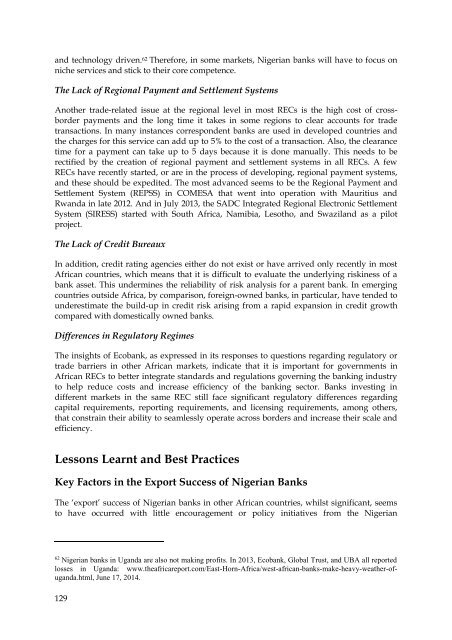- Page 1 and 2:
SERVICES EXPORTS FOR GROWTH AND DEV
- Page 4 and 5:
CONTENTS Acronyms and Abbreviations
- Page 6 and 7:
ACRONYMS AND ABBREVIATIONS ACP ADC
- Page 8 and 9:
FESPACO Festival Panafricain du Cin
- Page 10:
TVET TWA UACE UAE UBA UCL UEMOA UEP
- Page 13 and 14:
Each of the five case studies was t
- Page 15 and 16:
xiv
- Page 17 and 18:
Scope and Coverage of Case Studies
- Page 19 and 20:
transferring technology, skills, an
- Page 21 and 22:
Government Policies that Made a Dif
- Page 23 and 24:
availability of hotel accommodation
- Page 25 and 26:
2. Successful exports in one mode o
- Page 27 and 28:
TYPOLOGY OF FOUR MODES OF EXPORTING
- Page 29 and 30:
areas of the service, for example,
- Page 31 and 32:
to become the market leader in the
- Page 33 and 34:
Data from international organisatio
- Page 35 and 36:
Figure 1: Share of Services Subsect
- Page 37 and 38:
Figure 2: Structural Decomposition
- Page 39 and 40:
Air Transport Services Coverage in
- Page 41 and 42:
GTP on Air Transport Services Regar
- Page 43 and 44:
Table 6: Aviation Sector Performanc
- Page 45 and 46:
Ethiopia’s consideration of the s
- Page 47 and 48:
Definition Selected for This Study
- Page 49 and 50:
Boeing 767-200ER. EAL made history
- Page 51 and 52:
other construction and navigation f
- Page 53 and 54:
Market Structure International pass
- Page 55 and 56:
Ethiopian destinations. Revenue gen
- Page 57 and 58:
tourism, as well as the transaction
- Page 59 and 60:
independently, and are intermediate
- Page 61 and 62:
Table 10: Strengths, Weaknesses, Op
- Page 63 and 64:
Yamoussoukro Decision, the guidelin
- Page 65 and 66:
Geographical Positioning and Human
- Page 67 and 68:
EAL has remained flexible when nece
- Page 69 and 70:
South Africa, Zambia, and Tanzania.
- Page 71 and 72:
Bibliography Abeyratne, Ruwantissa
- Page 73 and 74:
Ethiopian Ministry of Finance and E
- Page 75 and 76:
Annex 1: Questionnaire Used for the
- Page 77 and 78:
Annex 2: Pictorial Representations
- Page 79 and 80:
64
- Page 82 and 83:
3. BANKING SERVICES: A CASE STUDY O
- Page 84 and 85:
institutions are in charge of servi
- Page 86 and 87:
witnessed a decline between 2007 an
- Page 88 and 89:
hand, the eight countries of the Un
- Page 90 and 91:
(f) Evaluate the opportunities for
- Page 92 and 93:
significant share of services outpu
- Page 94 and 95: Nigeria has several natural and cul
- Page 96 and 97: Sector Male Female Total Activities
- Page 98 and 99: Annex 3 (Table A1) also shows the a
- Page 100 and 101: Sector Industrial Sector Energy Tou
- Page 102 and 103: matters regarding trade negotiation
- Page 104 and 105: to the changes in interest rates by
- Page 106 and 107: hoped that these activities will ra
- Page 108 and 109: economic controls. Specifically, th
- Page 110 and 111: Resuscitation and enforcement of do
- Page 112 and 113: All financial institutions require
- Page 114 and 115: Current Banking Services Activities
- Page 116 and 117: Bank Total Assets Foreign Locations
- Page 118 and 119: 1961 1963 1965 1967 1969 1971 1973
- Page 120 and 121: is a membership-driven institute wh
- Page 122 and 123: Table 17: CIBN Membership Statistic
- Page 124 and 125: Table 20: Share of Banks’ Profit
- Page 126 and 127: 2009, it increased after conditions
- Page 128 and 129: Contribution of Banking Services to
- Page 130 and 131: Year Agriculture Manufacturing Serv
- Page 132 and 133: Figure 5: Percentage Growth of UBA
- Page 134 and 135: generally suggests that the growth
- Page 136 and 137: epresentative offices in Beijing, D
- Page 138 and 139: 1989 16. Ecobank Côte d’Ivoire a
- Page 140 and 141: Figure 13: Percentage Growth of ETI
- Page 142 and 143: premiums on conversion of local cur
- Page 146 and 147: From previous reforms, to the 2005
- Page 148 and 149: come to dominate the system in the
- Page 150 and 151: In conclusion, it may not be as mea
- Page 152 and 153: BGL Research. Getting Banks to Lend
- Page 154 and 155: Musuku, Thilasoni, et al. Increasin
- Page 156 and 157: Business Day. ‘Ghana Approves Tak
- Page 158 and 159: Annex 2: List of Services Imported
- Page 160 and 161: Table A2: Share of Services Value A
- Page 162 and 163: Table A3: Share of Services Value A
- Page 164 and 165: Table A4: Nigeria’s Trade in Serv
- Page 166: Table A8: Total Number of Employees
- Page 169 and 170: Information Systems, Networks and I
- Page 171 and 172: enterprises. Preferences may includ
- Page 173 and 174: Growth Rate (%) Share of GDP (%) Fi
- Page 175 and 176: Table 1: Examples of Approved Proje
- Page 177 and 178: principles included in the WTO Tele
- Page 179 and 180: Layer 2 includes telecommunications
- Page 181 and 182: firms involved in the wholesale/ret
- Page 183 and 184: Figure 4: Cross-border Exports of
- Page 185 and 186: 9 days. Thus the application of ICT
- Page 187 and 188: software; system integration; compu
- Page 189 and 190: years’ experience in BPO in Seneg
- Page 191 and 192: 3. Proactive policies in services,
- Page 193 and 194: Due to labour shortages for young g
- Page 195 and 196:
Institutions When it comes to servi
- Page 197 and 198:
Financial Attractiveness Other fact
- Page 199 and 200:
Proactive Policies to Promote Expor
- Page 201 and 202:
Table 13: SWOT Analysis: Senegal as
- Page 203 and 204:
promote more coherent efforts in su
- Page 205 and 206:
Bibliography ANDS. Second Follow-up
- Page 207 and 208:
Annex 1: Evaluation Framework for t
- Page 209 and 210:
Annex 3: Standards and Certificatio
- Page 211 and 212:
Sectors or Subsectors Mobile cellul
- Page 213 and 214:
Annex 5: Short Version of the Quest
- Page 215 and 216:
1. Is the classification system use
- Page 218 and 219:
5. CULTURAL INDUSTRIES: A CASE STUD
- Page 220 and 221:
will help generate new opportunitie
- Page 222 and 223:
Mode 4, Presence of Natural Persons
- Page 224 and 225:
(d) Evaluate the factors that have
- Page 226 and 227:
Organisation of the Report The pres
- Page 228 and 229:
Percent Table 2: Balance of Service
- Page 230 and 231:
(notably the balance of payments) c
- Page 232 and 233:
With the exception of the travel co
- Page 234 and 235:
goods and products that are not ban
- Page 236 and 237:
Table 7: Involved Private and Publi
- Page 238 and 239:
particular. Because cultural produc
- Page 240 and 241:
copyrights 25 ), artistic expressio
- Page 242 and 243:
Ministers of Culture to endorse the
- Page 244 and 245:
Categories of Members 2000 2001 200
- Page 246 and 247:
lack of funding, a high level of di
- Page 248 and 249:
Success Story: Biz’Art Production
- Page 250 and 251:
Success Story: Cartel 38 Aware of t
- Page 252 and 253:
museums are currently operated comm
- Page 254 and 255:
Market Structure Providing adequate
- Page 256 and 257:
Human Capital Formation The continu
- Page 258 and 259:
creative goods were greatly at odds
- Page 260 and 261:
Figure 5: Different Types of Cultur
- Page 262 and 263:
The fees paid by the advertisers (c
- Page 264 and 265:
Estimated Employment Generated by C
- Page 266 and 267:
Table 30: Exports of Artefacts and
- Page 268 and 269:
more visitors than FESTIMA. From th
- Page 270 and 271:
impact of these imports on the bala
- Page 272 and 273:
Exports Total % Main Export Market
- Page 274 and 275:
First, the lack of available data a
- Page 276 and 277:
Moreover, the unequal distribution
- Page 278 and 279:
telecommunication networks), and in
- Page 280 and 281:
improve and support the development
- Page 282 and 283:
Inclusion of Cultural Services in E
- Page 284 and 285:
To ensure the provision of financia
- Page 286 and 287:
To improve market intelligence and
- Page 288 and 289:
Table 41: Practical Tools for the P
- Page 290 and 291:
Competitiveness Issues associations
- Page 292 and 293:
Competitiveness Issues services sec
- Page 294 and 295:
Bibliography Articles and Books CE,
- Page 296 and 297:
Paugam, J.M. (2013). Trade in Servi
- Page 298 and 299:
Table 45: Distribution of Cultural
- Page 300 and 301:
Annex 2: Questionnaire for the Priv
- Page 302 and 303:
3.2 Pour les festivals / Musées et
- Page 304 and 305:
4.2 Les ressources humaines qualifi
- Page 306:
Une règlementation en terme de dro
- Page 309 and 310:
There are factors which have favore
- Page 311 and 312:
The UN’s Provisional Central Prod
- Page 313 and 314:
Because education is designated as
- Page 315 and 316:
Global and Regional Trends in Trans
- Page 317 and 318:
(a) joint degrees between different
- Page 319 and 320:
education services imports. Accordi
- Page 321 and 322:
2006 2007 2008 2009 2010 2011 Finan
- Page 323 and 324:
Services Sector Export Strategy As
- Page 325 and 326:
tailoring, hairdressing, catering,
- Page 327 and 328:
improvement measures in delivering
- Page 329 and 330:
state of Kenya, Tanzania, and Ugand
- Page 331 and 332:
Figure 2: Enrolment of Foreign Stud
- Page 333 and 334:
Strengths, Weaknesses, Opportunitie
- Page 335 and 336:
tended to attract more students loc
- Page 337 and 338:
total government expenditure, publi
- Page 339 and 340:
Uganda’s declining market share o
- Page 341 and 342:
management processes leading to inc
- Page 343 and 344:
educational cooperation between Uga
- Page 345 and 346:
Uganda Christian University Uganda
- Page 347 and 348:
the university closer to its foreig
- Page 349 and 350:
At present there are no internation
- Page 351 and 352:
Using Social Media for University P
- Page 353 and 354:
338 6) Grant all universities disco
- Page 355 and 356:
Bibliography Alpen Capital. GCC Edu
- Page 357 and 358:
Tierney, William G., and Findlay, C
- Page 359 and 360:
Name of Institution Address Details
- Page 361 and 362:
iii. Students from outside Africa _
- Page 363 and 364:
9. Does your institution collaborat
- Page 365 and 366:
If so please elaborate below. _____
- Page 368 and 369:
AUTHOR BIOGRAPHIES Abiodun Surajude
- Page 370 and 371:
awareness of the relationships amon
- Page 372:
African Union Headquarters P.O. Box




